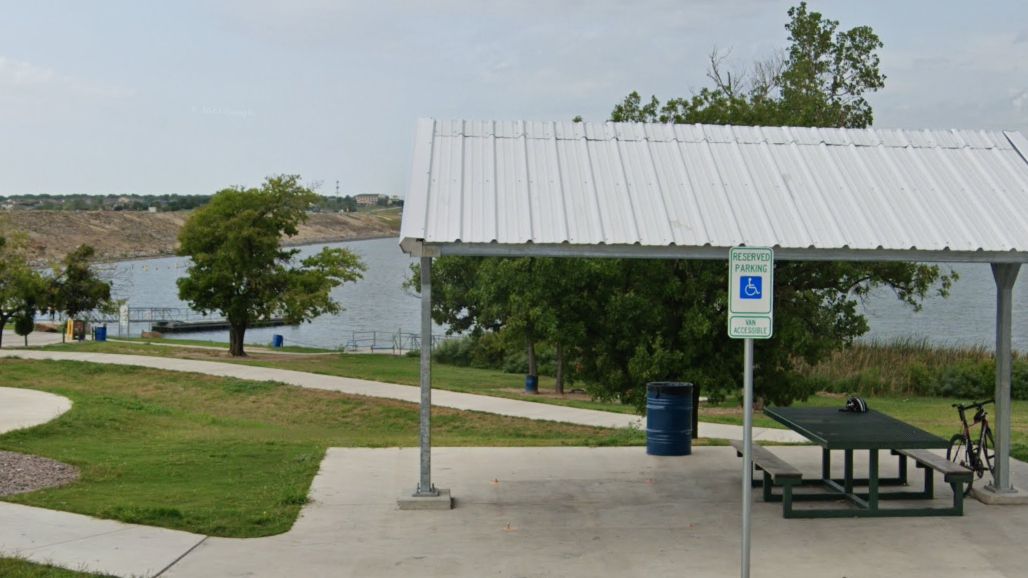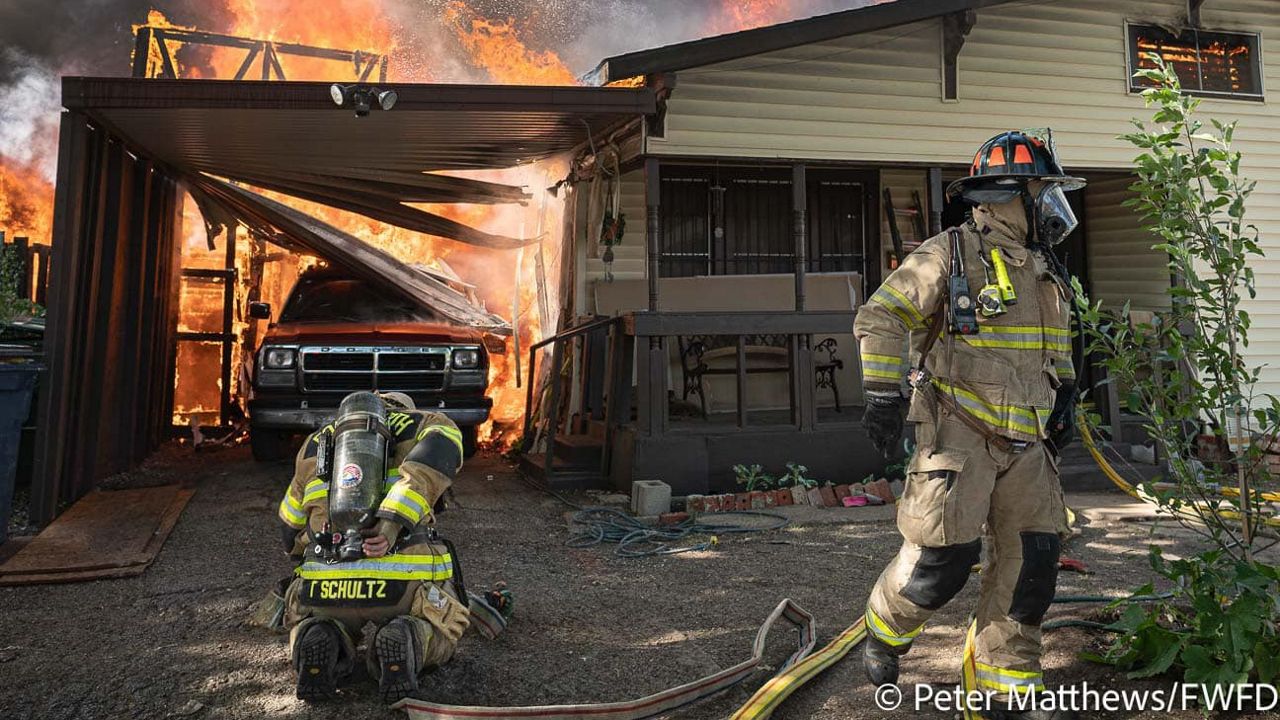FORT WORTH, Texas — Elaine Williams received a letter from the Texas Railroad Commission informing her that the state was allowing an oil and gas company to take her minerals without compensating her. Williams had been approached by various companies over the years about signing a gas drilling lease, but she had questions about the noise, pollution and other factors that typically accompany urban drilling.
“I wanted answers to questions,” she said. “I didn't say ‘I won't ever do this.’ I said, ‘I want answers to these questions,’ and I never got the answers."
The 76-year-old Fort Worth resident refused to sign a lease with Chesapeake Energy Corporation many years ago, and now Total Energy — the France-based company that purchased the rights to minerals in Williams’ area near Lake Worth — is continuing its aggressive expansion in North Texas by using a little-known rule to grab all of the underground resources in the vicinity of her house, whether neighbors agree to it or not.
Rule 37 was created to ensure that companies don't drill too close to an existing pad site to avoid tapping into overlapping pools of minerals. A spokesperson for the Railroad Commission of Texas (RRC), the state agency tasked with regulating oil and gas companies (which was created by the oil and gas industry) said, “Statewide Rule 37 requires minimum distances between wells at drilling sites in order to protect field pressure and correlative rights.”
Under the rule, the RRC is allowed to grant exceptions that allow drillers to move closer to minerals that they don’t own — the usual justification is that without the unlicensed pool of minerals, the company won’t be able to generate enough pressure to bring the gas to the surface. But observers said oil and gas companies have learned that the RRC will almost always grant these exceptions, whether they are justified or not.
The exception to Rule 37 has become a legal mechanism used by oil and gas companies that some critics have decried as “state-sponsored theft.”
There is an appeals process for landowners who don’t want to give away their minerals, but most who have been through it say the hearing is little more than a dog-and-pony show, and the RRC will side with the oil and gas companies. Though the RRC doesn’t keep aggregate data on the win-loss records on hearings for exceptions, a spokesman for the organization pointed a reporter to three separate websites where the final orders on the hearings are stored. In a search of the first 50 cases on one of the pages, the RRC arbiter sided with the oil and gas companies 100% of the time.
One industry insider said he’s never heard of a business losing a hearing, and the only cases that residents ever win are on technicalities such as botched paperwork. The former oil and gas executive, who asked not to be named for fear of hurting his current career, guessed that the win-to-loss ratio was around 1,000 to 1. The process is so tipped in the favor of these companies, he said, most people don’t bother to protest.
Elaine Williams is not most people. When the RRC told her that everyone in her neighborhood had been notified of the more than 200 Rule 37 exception cases that Total has filed in the area, she went door-to-door to verify that people knew what was happening. Almost none of the people she spoke to knew anything about the Rule 37 applications.
“Whenever they sent [the notification letter], they gave me a long list — front and back — of people they said they had tried to contact or they said they had contacted,” she said. “One of them was my neighbor caddy-corner to me. So I went over there and we talked in his driveway. Neither one of us has ever signed that we would take money or do anything with this. He signed a [protest] form right there in his driveway.”
After her initial protest was declared invalid because of a paperwork error, she tried a second time to fight for her minerals. This time, she successfully protested her case and helped neighbors file their protests. Total tried once again to buy her minerals, but, she said she’s past that point.
“In this process, I have discovered that all of these things are hidden in plain sight,” she said of the Rule 37 exception process. “I'm becoming aware of just how sneaky they are.”
Gas drilling in her area has already taken a toll on her health and quality of life, she said.
“I literally cannot drink my own water in this house anymore,” she said. “I tell my overnight visitors, my family, not to even brush their teeth with the water — to use my bottled water. Whenever I take a shower, I'm very careful. I’ve been using paper plates and plastic [utensils] for years now.
“I literally was getting sick,” she said. “I was getting so sick.”
Williams and her neighbors who have chosen to protest Total’s application for a Rule 37 exemption are about to go through a process that critics allege is almost impossible to win.
Residents are required to travel to Austin on a weekday to attend their hearing — there is also an option to have the hearing over the phone, but that has only existed since 2017, and it would make presenting evidence or fairly cross-examining witnesses nearly impossible. Residents can request an alternative hearing site, but both parties would have to agree to the change.
Oil and gas companies employ a team of attorneys and expert witnesses to fight residents’ claims to their own minerals. While there is a discovery period, most residents don’t have the legal savvy to ask for it, and they are blindsided by testimony replete with myriad slides and dense scientific jargon. Anyone can hire an attorney to represent them, but oil and gas attorneys are uniquely specialized and expensive. Spectrum News 1 reached out to one such attorney based in Fort Worth, and his rates started at $300 an hour.
The judges in these cases are not required to be elected judges, attorneys, or even have a basic understanding of the law. They are political appointees who are handpicked by a government body known for protecting oil and gas interests.
Emeka Duruigbo, Professor of Law and Co-Director of the Institute for International and Immigration Law, Thurgood Marshall School of Law at Texas Southern University, is one of the few academics who has done extensive scholarly research on the cross-section of property rights and oil and gas law. He said Rule 37 by itself is a good one — society, he argues, needs the underground gas to fuel our lives — but the hearing process for exceptions, he said, is inherently unfair.
“It’s a David versus Goliath fight, and the little guy is outmatched,” he said. “There’s a battery of lawyers with experience in these kinds of cases prepared to fight you. This is what they do. So, the private citizen comes in with nothing. They don’t even have the scientific information to back up their claims.”
Ranjana Bhandari, executive director of Livable Arlington — a grassroots environmental organization that frequently takes on oil and gas companies — went through the RRC’s Rule 37 exception hearing process. She just so happens to hold a Masters in economics, and her husband, a university professor, holds a PhD in physics. Even with their unique expertise to argue their case, the RRC’s arbiter still sided with the oil and gas company. The couple was given only a few minutes to examine the oil and gas company’s data.
“I can only speculate but it seemed that there was asymmetry in treatment of the two sides,” she said. “Even though we were the victims, we were the injured party. We were the ones being dragged out of our homes in Arlington on a working day at great inconvenience, trying to learn all these arcane rules, trying to understand the technology and trying to understand something that most mineral owners know very little about.
“I've never had heard of a case where a potential robber can go to the legal system and say, ‘Can you please have Ranjana explain to you why you shouldn't rob her?”
Duruigbo emphasized that the hearings are well outside of any traditional legal standards.
“They are acting like a court,” he said. “The Railroad Commission has the [judges] sit there. They're not required to be lawyers. They're not judges. They're usually political appointees or they are elected. So any politician who collects money from vested interests [through an election] sits there and makes decisions.”
In April 2013, Duruigbo conducted a focus group of residential property owners in the Dallas-Fort Worth-Arlington area who were targeted for gas drilling underneath their homes.
In the resulting article, the professor concluded that unfair granting of the Rule 37 exception was an abuse of power and an affront to the rights of property owners.
“Participants, numbering about 12 men and women, decried energy developers’ interference with their property freedom and their ability to holdout when negotiations are orchestrated,” the article says. “After examining applicable legal provisions and hearing the concerns of the focus group participants, it is apparent that the … unfair granting of exceptions to spacing rules do interfere with the property freedom of small tract owners. They also encroach on their power to holdout for better deals or more desirable outcomes.”
Oil company landmen also know that the game is rigged, and they frequently use that as a negotiation tactic when trying to buy a person’s gas rights.
“When landmen and Chesapeake's representatives contacted us a few times to see if they could change our mind, their biggest selling point was, ‘It's going to be expensive for you to defend yourself,’ ” Bhandari said. “ ‘You are going to lose. So isn't it better for you to just sign the lease now? We are going to drill anyway. One way or the other, we'll get permission to drill, and the only difference will be that you won't be paid.’ I heard this over and over again from landman, from Chesapeake employees who called us. And so, because the system is so unfair to mineral owners, they can very easily be coerced by the drillers.”
Even knowing all of this, Williams said she is undeterred. Now that she’s had a chance to do more research on the environmental impact of urban gas drilling, she’s determined to at least make herself a pest to Total Energy.
Since filing her appeal, she said the company has once again contacted her about buying her minerals, but this time at a reduced rate.
“I just laughed at him,” she said of her recent encounter with a landman. “I said, ‘If I didn't take over $5,000, what makes you think I'm gonna take $1,000?’ ”









